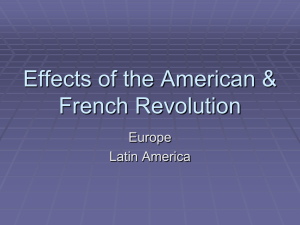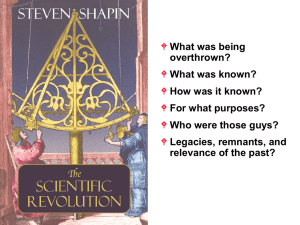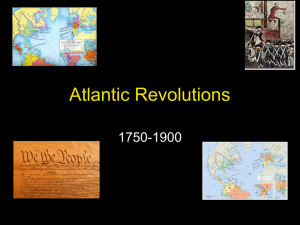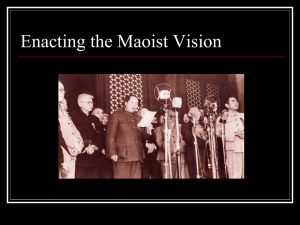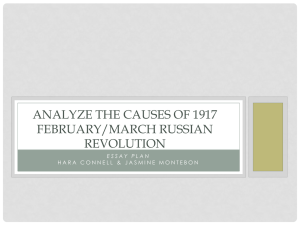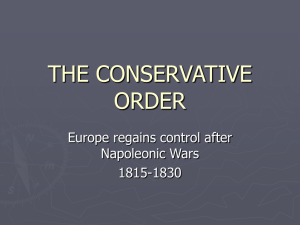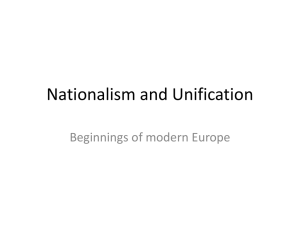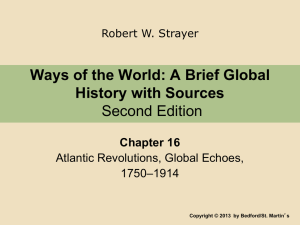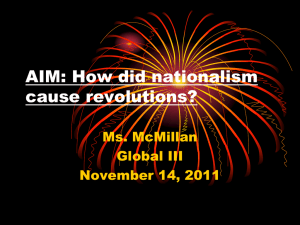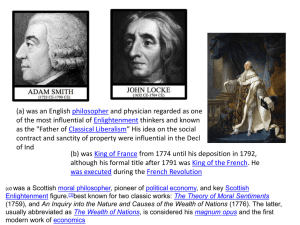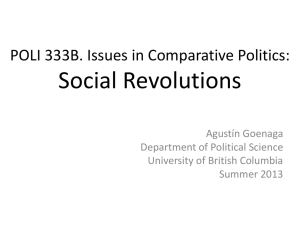Chapter 29 Revolutions and National States
advertisement
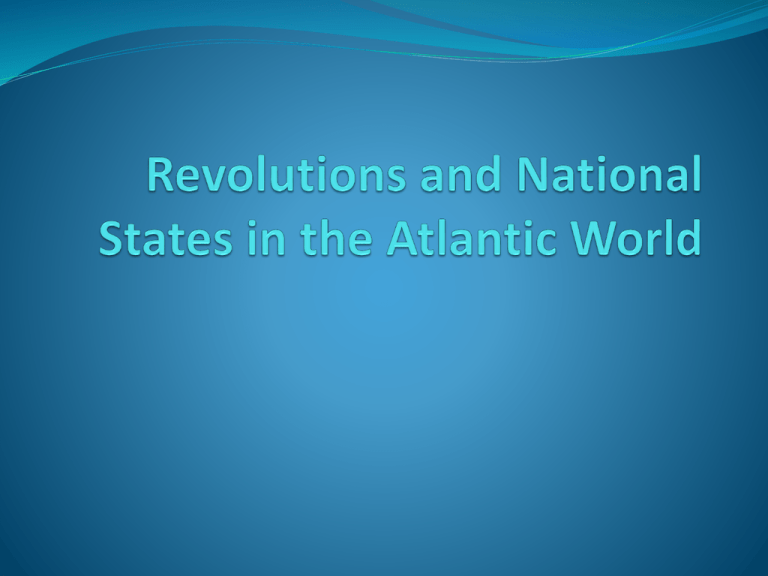
Before we get started This chapter is about political, social and intellectual revolutions. It is a prime chapter for essays on the national exam. Popular Sovereignty and Political Upheaval The era of revolutions in the late eighteenth centuries had two major global results: Spread the Enlightenment ideals concerning freedom, equality, and sovereignty. Fuel the consolidation of nation-states Popular Sovereignty and Political Upheaval Enlightened and Revolutionary Ideas John Locke Government as a contract – Political power should lie with the people and the role of the rulers should be to serve the best interests of the people. When a ruler fails to do so, he should be removed. Voltaire Called for religious toleration and freedom of expression Jean-Jacques Rousseau Demanded legal and political equality for all men and said that the general will of the people should rule. Political Sovereignty and Political Upheaval The American Revolution Fought against the British in large part to the concept of “Taxation without Representation” 1775 – Continental Congress formed to coordinate resistance to British Policies July 4, 1776 – Declaration of Independence signed (Based largely on the philosophies of John Locke) America wins after nearly 5 years of fighting 1787 – American Constitution drafted, emphasizing a federal government based on popular sovereignty and individual liberties. Popular Sovereignty and Political Upheaval The French Revolution Drew inspiration from the American Revolution, but became much more radical. Goal was to replace the ancient regime (Monarchy) with new cultural, societal, and political structures. Financial crisis in Louis XVI’s administration called for a meeting of the Estates General (1st Clergy, 2nd Nobility, 3rd Everyone else) 3rd Estate left and formed National Assembly and took the Tennis Court oath in 1789 demanding a Constitution. Once they had power, the National Assembly began reconfiguring French society by abolishing the privileges of the first 2 estates. Eventually, under the leadership of Maximillian Robespierre the revolution took a radical turn and by 1794 the King, his wife, and over 40,000 counterrevolutionaries had been killed by the Guillotine. Eventually turned on itself and Robespierre was put to death. Popular Sovereignty and Political Upheaval The Reign of Napoleon Napoleon Bonaparte Made a name for himself on the battlefield and as a fervent support of the revolution, Napoleon first joined the Directory and then overthrew it. Imposed a new constitution and eventually named himself Emperor of France. Returned a fair amount of stability to France, but also limited things like free speech and the rights of women. Amazing tactician and military strategist Conquered the Iberian and Italian peninsulas, occupied the Netherlands, inflicted major defeated on the Austrian and Prussian armies, and formed an alliance with the Russian Czar. “General Winter” 1812 was the beginning of the end for Napoleon when he lost over 500,000 soldiers by invading Russia in the winter. Final defeat for Napoleon came at the Battle of Waterloo, after which he was exiled to St. Helena in the south Atlantic. The Influence of Revolution The Haitian Revolution Haiti was a wealthy French sugar, coffee, and cottonproducing colony located on western Hispaniola. 1790 – Population included about forty-thousand white French settlers, thirty thousand free people of color, and about five hundred thousand African slaves. Conditions were very harsh and many slaves escaped to form maroons. 1791 – Boukman, a Voudou priest, led a group of slaves against white plantations owners to start the Haitian Revolution. Toussaint Louverture took over after Boukman’s death to lead the revolution to success. By 1804 Haiti had defeated the French armies and become an independent republic. The Influence of Revolution Wars of Independence in Latin America The ideals of the Enlightenment and of revolution spread to the Portuguese and Spanish colonies in the Americas. Between 1810-1825 the criollos (individuals born in the Americas of Spanish or Portuguese descent) successfully led independence movements and established republics in all Spanish colonies in the Americas except Cuba and Puerto Rico. Mexico Key players: Father Miguel De Hidalgo Simon Bolivar Influential in ridding Colombia, Venezuela, Ecuador, Peru, and Chile of Spanish influences Brazil Key Players: Prince Pedro The Influence of Revolution The Emergence of Ideologies: Conservatism and Liberalism Two important ideologies grew out of responses to the American and French Revolutions: Conservatism and Liberalism Conservatism: Viewed society as a slowly developing organism which must be protected from radical or revolutionary ideas as those beliefs lead to anarchy. Liberalism: Welcomed change which they saw as normal and indeed required in the concept of progress. The Influence of Revolution Testing the Limits of Revolutionary Ideals: Slavery The ideals of freedom and equality which had survived and evolved during the political revolutions of the late eighteenth and early nineteenth centuries were eventually applied to the issue of slavery. Olaudah Equiano influential early. William Wilberforce – Leader in the movement to abolish slavery in Britain. Abolition: 1833-Britian, 1848-France, 1865-U.S., 1886Cuba, 1888-Brazil Political equality for Africans and African-Americans took much longer. The Influence of Revolution Testing the Limits of Revolutionary Ideals: Women’s Rights Women had participated in the eighteenth-century political revolutions and in the nineteenth-century abolition movement. Sought to make a case for women’s rights as well. Eighteenth Century – Mary Wollstonecraft influential arguing that women possessed all the rights John Locke had said belonged to men. Nineteenth Century – Elizabeth Cady Stanton Pushed for more access to education and voting rights. The Consolidation of National States in Europe While the revolutions of the late eighteenth and early nineteenth centuries helped to spread the ideals of freedom, equality, and popular sovereignty, the Napoleonic wars of the same era helped to spread the concept of nationalism. Nationalism – The belief that people belong to distinctive national communities based on a shared sense of identity through language, custom, religion, and tradition. Promoted prosperity and glory, which often fostered jealousy and distrust of other national groups. The Consolidation of National States in Europe Nations and Nationalism Supporters of nationalism insisted that one’s national state boundaries should be reflected in a shared territory and a shared destiny. One unintended consequence of nationalist movements was to foster separations between minority groups within the societies and to distinguish those groups from people in other lands. Suspicion of minority groups fueled historic antiSemitism, which eventually led to the Jewish push for a national homeland for Jews in Palestine, the location of ancient Israel. The Consolidation of National States in Europe The Emergence of National Communities The French Revolution and Napoleonic Wars heightened the sense of national identity across Europe and, in turn, instilled fears of nationalism in the hears of conservative political leaders. Congress of Vienna in 1814-1815 attempted to remake the map of Europe and restore the “legitimate” rulers displaced by revolution and war. Nonetheless, nationalistic movements continued to make headway throughout Europe. The Consolidation of National States in Europe The Unification of Italy and Germany Italy Since the fall of the Roman Empire, Italy and Germy had been disjoined regions, frequently controlled by outside powers such as Spain or Austria. Mid 1800s – combined efforts of Camillo di Cavour, Kin Vittore Emmanuele II of Piedmont, and Guiseppe Garibaldi allowed Italy to oust the Spanish and Austrians and create an independent Italy. Germany 1862 – Otto von Bismark appointed prime minister by King Wilhelm II and used war and industry to fuel support for a unified nation embracing all German-speaking people.


